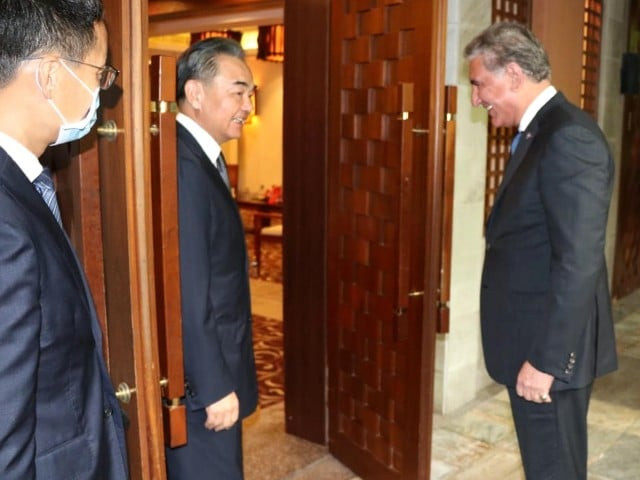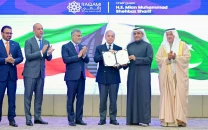China backs Pakistan on choosing ‘independent’ path
Opposes any unilateral actions that complicate IIOJK situation

China on Friday threw its weight behind Pakistan for “independently” choosing a development path based on its “national conditions”, striving for a better external security environment and playing a more constructive role in international and regional affairs.
It came as a part of a joint statement issued after talks between China’s State Councilor and Foreign Minister Wang Yi and Foreign Minister Shah Mahmood Qureshi in Beijing.
The visit was undertaken against the backdrop of a host of regional developments suggesting new alignments with China increasingly taking the lead in shaping the dynamics.
Both sides reviewed bilateral ties, including the China-Pakistan Economic Corridor (CPEC), regional and international issues as well as how to deal with the Covid-19 pandemic, particularly its economic fallout.
But the significant part of the joint statement was China’s support for Pakistan to independently evolve policies suited to its national interests.
“The Chinese side reiterated that Pakistan and China are iron brothers and Pakistan remains China’s staunchest partner in the region and that China firmly supports Pakistan in safeguarding its territorial integrity, sovereignty and independence, independently choosing a development path based on its national conditions, striving for a better external security environment and playing a more constructive role in international and regional affairs,” the joint communiqué read.
🇵🇰 🇨🇳
— Spokesperson 🇵🇰 MoFA (@ForeignOfficePk) August 21, 2020
State Councilor/FM Wang Yi & FM @SMQureshiPTI held 2nd Round of China-Pakistan Foreign Ministers' Strategic Dialogue in #Hainan,China.
Two sides exchanged views on #COVID__19, bilateral relations, int’l & regional issues of mutual interest. 1/5 pic.twitter.com/yEFqAd1iNU
This statement may be aimed at conveying a message to those countries – some of which are Pakistan’s friends – not to persuade Islamabad to take decisions that may hurt the country’s long-term interest.
It is believed that certain Pakistani friends in the Arab world are pushing Islamabad to distance itself from China and forge closer ties with the US and its allies.
But Prime Minister Imran Khan in a recent television interview made it clear that Pakistan considered China a long-term strategic and economic partner.
The joint statement suggests that Pakistan is not ready to compromise on the Belt and Road Initiative (BRI) and would continue to pursue its flagship programme—CPEC—irrespective of the pressure being exerted by certain international players.
They underscored that CPEC has entered the new phase of high-quality development, and has played and will continue to play an important role in supporting Pakistan to overcome the impact of Covid-19 and achieve greater development.
The two sides will continue to firmly advance the construction of CPEC, ensure in-time completion of those projects under construction, focus on economic and social development, job creation and improvement of people's livelihood, and further strengthen cooperation in special economic zones, industrial relocation, science and technology, medical and health, human resources training, poverty alleviation, and agriculture etc, with the aim to continuously unleash the great potential of CPEC to make it a hub of regional connectivity.
The two sides expressed satisfaction on agreements reached on the recent mega energy projects and looked forward to convening the 10th JCC meeting at the earliest possible date to promote CPEC to make positive contributions to the high-quality construction of the BRI.
Both sides reaffirmed the principle of wide consultation, joint contribution and shared benefits in building CPEC, and welcomed the international community to join in the CPEC construction on the basis of consensus to achieve shared development.
The foreign ministers also discussed the regional security situation, including Kashmir. They underlined that a peaceful, stable, cooperative and prosperous South Asia was in the common interest of all parties.
Parties need to settle disputes and issues in the region through dialogue on the basis of equality and mutual respect.
The Pakistani side briefed the Chinese side on the situation in Indian Illegally Occupied Jammu and Kashmir, including its concerns, position and current urgent issues.
The Chinese side reiterated that the Kashmir issue is a dispute left over from history between India and Pakistan, which is an objective fact, and that the dispute should be resolved peacefully and properly through the UN Charter, relevant Security Council resolutions and bilateral agreements. “China opposes any unilateral actions that complicate the situation.”
On its part, the Pakistani side appreciated China for standing together with Pakistan in safeguarding its national security and sovereignty, and reaffirmed its firm support to Beijing on affairs concerning China's core interests and issues of major concern, such as those related to Taiwan, Xinjiang, Tibet and Hong Kong.
The two sides reiterated that the enduring China-Pakistan All-weather Strategic Cooperative Partnership is beneficial to international and regional peace and stability, and serves the mutual security and development interests of both the countries as well as of international community and regional countries. Both the sides were committed to firmly implementing the consensus reached between the two leaders, enhancing mutual strategic trust, strengthening all-round cooperation, maintaining momentum of high-level exchanges, further advancing construction of the BRI, promoting bilateral relationship to a higher level, and delivering greater benefits to both countries and the two peoples.
They expressed satisfaction over cooperation on regional and international issues at multilateral fora such as the UN, Shanghai Cooperation Organisation and Asean Regional Forum, and agreed to deepen coordination and cooperation to safeguard mutual interests and uphold principles of fairness and justice.
Both the sides reaffirmed their commitment to the purposes and principles of the UN Charter, and support for multilateralism, free trade and win-win cooperation, and opposition to unilateralism, protectionism and coercive practices.
The two sides agreed to strengthen cooperation on the Afghan issue and appreciated the efforts made by the Afghan government and the Taliban to initiate the intra-Afghan negotiations. They emphasised the importance of an inclusive, broad-based and comprehensive negotiated agreement for future political settlement in Afghanistan.
Reaffirming their commitment to an Afghan-led and Afghan-owned peace process, both the sides encouraged relevant parties in Afghanistan to seize this historic opportunity and commence the intra-Afghan negotiations at the earliest leading to durable peace and stability in Afghanistan. China appreciated Pakistan’s positive contribution to the Afghan peace process and efforts for promoting peace and stability in the region and beyond.
Both China and Pakistan reaffirmed the vitality of the time-tested and All-weather Strategic Cooperative Partnership between the two countries which remains unaffected by the vicissitudes of regional and international developments and continues to move from strength to strength.
Both the countries agreed that they have stood in solidarity and worked together since the Covid-19 outbreak by timely sharing experiences related to the prevention and control of the virus, mutual support in providing medical materials, and have set an example for international community to jointly fight the pandemic.
They also agreed to further strengthen cooperation in developing a vaccine to defeat the Covid-19 pandemic, and strive to promote establishment of the China-Pakistan Community of Shared Future and Community of Common Health. Both the sides emphasised that unity and cooperation are the most powerful weapon for the international community against the disease.
The two sides opposed politicising the pandemic, labelling viruses, supported the WHO to play a leading role in global public health governance, and called for the international community to increase the sense of a community of shared future and carry out effective joint prevention and control measures in order to mitigate the negative effects of Covid-19.



















COMMENTS
Comments are moderated and generally will be posted if they are on-topic and not abusive.
For more information, please see our Comments FAQ